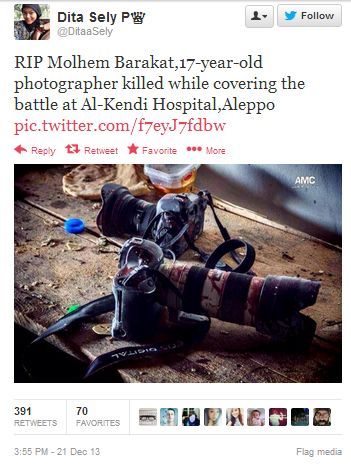A Reuters photographer, Molhem Barakat, was killed in Aleppo on Friday. Some emerging details of his life are raising uncomfortable questions for the wire service and for the press corps covering Israel and the PA.
1. Barakat was in his teens, possibly as young as 17 when he started working as a freelancer for Reuters. It’s not clear because his age — a basic piece of information for a story like this — is conspicuously absent from Reuters’s own report of Barakat’s death.
As Duckrabbit points out:
If he had been fighting he would have been classed as a child soldier.
2. Barakat tried to join Al-Qaida. After learning of the photographer’s death, Hannah Lucinda Smith wrote that Barakat was the subject of her story, My Friend, the Aspiring Suicide Bomber.
Smith adds that when Barakat began working as a photographer, he wanted to work with her. (“I refused, because I didn’t want the responsibility of an eager seventeen year old with no war zone training and little experience on my shoulders.”)
Here’s Smith on why Barakat wanted to join Al-Qaida. (In the story, Smith refers to him as Youssef, “to protect him from the repercussions of what he was saying.”)
As we passed through the battered streets he told me his reasons. First was the monthly salary of 11,000 Syrian lira. It is a pitiful wage for a potential suicide bomber, but enough to tempt an eighteen-year-old stuck in a war zone with no job, no money and nowhere to study . . .
As I looked at him in his Gucci polo shirt, jeans and modish haircut, I found it difficult to imagine him in the get up of an Islamic extremist. “Will you have to grow a beard?” I asked. “You know, I’m pretty sure they won’t accept me,” he replied. “I’m too liberal. But maybe they’ll think I’ll be useful to them, because I can still go into regime areas so I could transport weapons there for them.”
3. Barakat was talented. You’ll see that in photo collections at Buzzfeed, the Daily Telegraph and Daily Mail.
4. Barakat was possibly abused by Reuters. A lot of journalists working in the Syria are freelancers who need work and experience. It’s an arrangement that news services find appealing because it’s less expensive than sending an in-house correspondent. (The Columbia Journalism Review and Vice — via dvafoto — elaborate on the problems with this arrangement.)
From what Corey Pein has learned about the situation, Barakat got some decent hand-me-down equipment from Reuters, but no personal safety gear or training. He didn’t make much money for his blood, sweat and tears:
Molhem was paid as little as $100 for uploading a daily set of 10 or more photos to Reuters, according to a freelance photographer who met Molhem earlier this year in Aleppo and stayed in touch with him.
The photographer, Stanislav Krupar, says Molhem told him this at a Free Syrian Army base that hosted members of the news media.
If @reuters provided a kid with cameras but no body armour they need to hold an independent inquiry. Can it get worse?
— duckrabbit (@duckrabbitblog) December 23, 2013
The wire service, at the moment, is brushing off queries from people like Stuart Hughes (a BBC journalist active in media protection issues). You can judge Reuters’s safety guidelines for yourself.
5. Barakat leaves us with a lot of questions. A few of the more obvious ones already asked by Pein:
• Why did Reuters not mention Molhem’s age in its report on his death? If the agency did not know his true age, why not?
• Who besides the named editor reviewed the report on his death before publication? Was it reviewed by lawyers? [What about the statement published in response to the BBC’s questions?]
• Was he provided with any equipment from Reuters? What type? Did Reuters offer him a bulletproof vest, helmet or eye protection? A satellite phone?
• Was he provided with safety training? Was he provided with any training whatsoever?
• If he might have been deemed too inexperienced or unqualified to gain a staff job, why was he deemed fit to submit work from an immensely challenging, complex and dangerous environment?
 I have a few questions of my own:
I have a few questions of my own:
- To what extent did his Al-Qaida sympathies color his work for Reuters?
- Was Reuters at least aware that Barakat sought to become a suicide bomber? If yes, why did it feel comfortable hiring him? If not, why not?
- Are Western news services employing minors in Israel and the PA too? How difficult would it be to take advantage of an aspiring kid with a knack for camera work?
- How concerned should we be about Palestinian stringers with terrorist sympathies? What does this say about Israeli restrictions on Palestinian journalists?
- Were journalists injured during Israeli army operations adequately trained and equipped for personal safety? Do news services share culpability for incidents typically blamed on the IDF?
- What does the news industry’s heavy reliance on local stringers say about news coverage of Syria? How comparable is this to coverage of Israel and the PA?
(Image via Facebook/Molhem Barakat)

